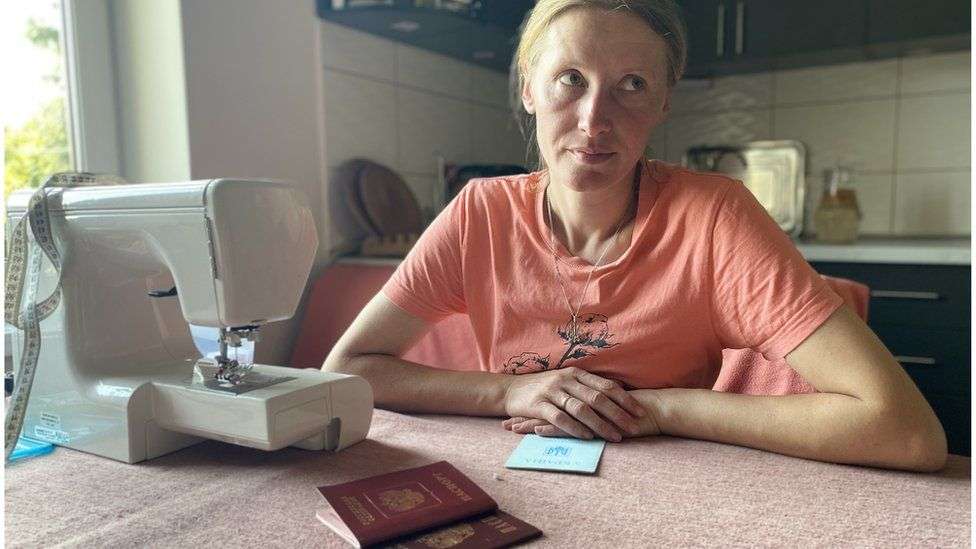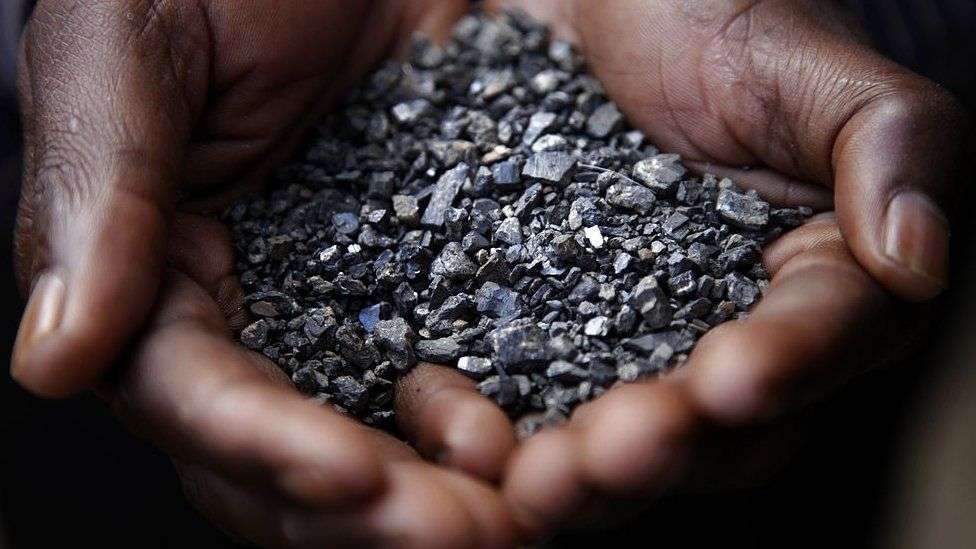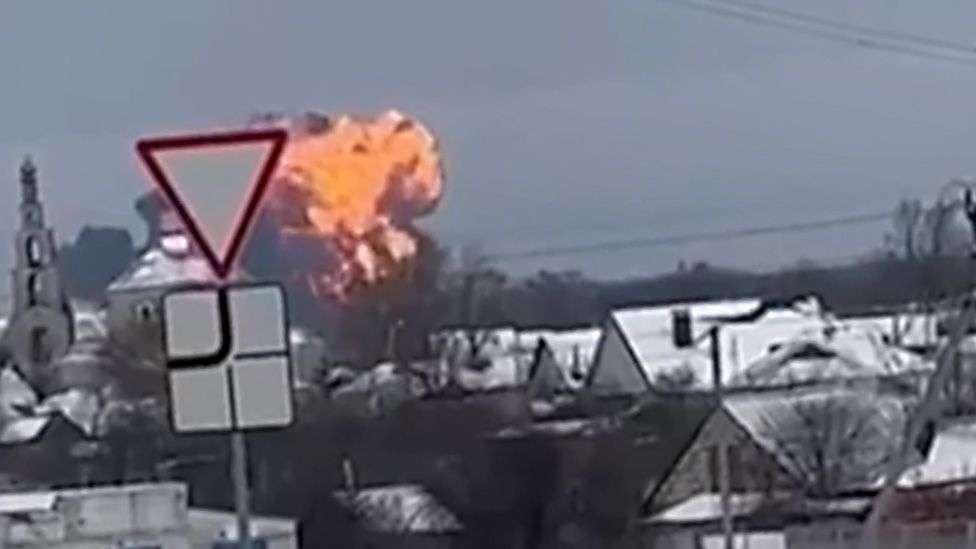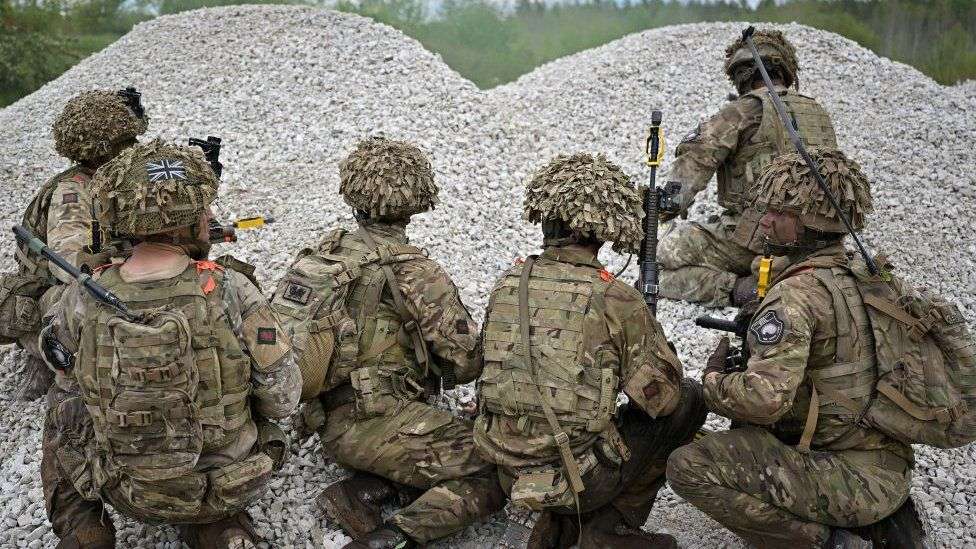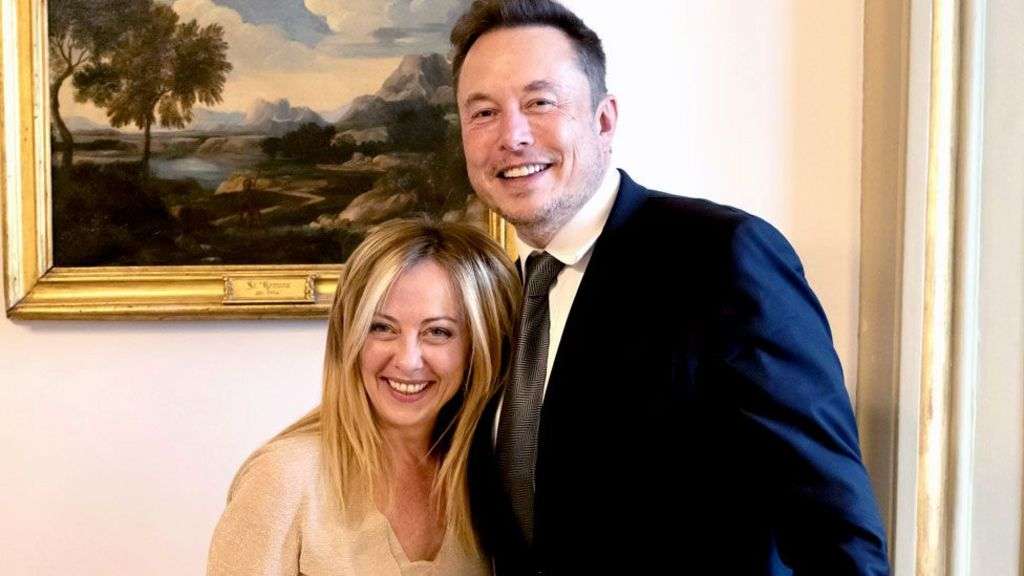Galina was born in Ukraine. She speaks Ukrainian, her husband is serving in the Ukrainian army, and she lives in a village south of the central Ukrainian city of Vinnytsia.
But Galina is legally Russian. As a child, she moved there, where she then became a citizen.
It means she - like thousands of other Russians in Ukraine - is now in a legal limbo.
"When you show your documents, people think you're something strange," she tells me in her kitchen, where she spends her time stitching T-shirts for wounded Ukrainian soldiers.
Ukraine's state migration service insists that all foreigners in Ukraine have equal rights as each other, and no one nationality is discriminated against.
But some allege this isn't the case. Lawyers working with Russians in Ukraine for instance told the OceanNewsUK their clients face having their accounts frozen.
After Russia launched its full-scale invasion, Ukraine's National Bank restricted financial services for all Russian and Belarusian citizens, although it says those with a residence permit are not affected.
Galina disagrees. She says that because of her passport, she can't get a job, and fears her bank account could be blocked.
She is seven months pregnant but because she's not legally Ukrainian, she can't access free state health services.
Galina also worries she won't be able to register her child's birth: after she married her Ukrainian husband Maksym in a church, she says that officials refused to recognise the union because of her unsettled status.
"They said, 'Come back when you have a passport'," explains Galina. "They can't understand who I am." Under Ukrainian law it's banned to have joint citizenship, although some do.
She started applying to become a Ukrainian citizen but was unable to complete the process because of Russia's full-scale invasion. Now Galina's temporary Ukrainian passport has expired, she says she feels like a "hostage of Russia".
"Changing passports was difficult even before the war - now it's impossible," she says.
On Povitroflotskyi Avenue in central Kyiv sits a three-storey white building with an overgrown garden. It's surrounded by a tall, barbed wire fence and the shutters are firmly down.
They have been since 23 February last year when staff at the Russian Embassy evacuated for "safety reasons". A day later Moscow launched its full-scale invasion, and what was left of the diplomatic relations between Kyiv and Moscow disintegrated.
It means thousands of people in Ukraine, like Galina, are living in uncertainty.
Currently there are more than 150,000 Russians with permanent residency permits in Ukraine. Around 17,000 have temporary ones.
For them to successfully apply for a Ukrainian passport or citizenship, they first need to physically give up their Russian citizenship. Moscow made that process complicated: to do so, they'd have to surrender their papers in either a Russian consulate abroad, or Russia itself.
There are no guarantees Galina wouldn't be arrested in the process, or end up stranded outside Ukraine.
As Galina's children arrive back from school, you can see the anguish in her eyes. An anxiety she attempts to hide from her children.
But she refuses to hold Ukraine accountable, or to claim discrimination.
She pins all her blame on Russia for her situation, as well as her Russian family members who've chosen to support their country in its so-called "special military operation".
"How can I support a robber, a rapist and a murderer who breaks into my home?" she says.
After Galina finishes a video call with her husband Maksym, I ask her what would happen to her family if he was killed on the front line.
She puts her hand over her mouth. A thought she's tried to put to the back of her mind, suddenly at the forefront.
"It's very scary," she says. "Even if he gets wounded, I wouldn't be able to visit him in hospital, because we're not technically married."
"To the rest of the world we're strangers."
'I chose Ukraine'
When Anastasia Leonova, a Russian, moved from Moscow to Kyiv in 2015, her friends warned her she "wouldn't be allowed to speak Russian" and that "there were only Nazis there".
It was a Russian propaganda narrative which annoyed her, as she had uncles and cousins living in Ukraine.
Anastasia's relocation followed her online criticism of Russia's 2014 annexation of Crimea and backing of separatist militants, which led to her losing her job in Russia as well as receiving death threats.
On 24 February last year, as Russian troops moved towards Kyiv, Anastasia says she only had one thought in her mind - to stay and fight.
"My blood is part Ukrainian," she says. "I was born as a part of Ukraine."
"I chose Ukraine as my homeland; I could not betray this choice".
She volunteered to be a combat medic with Ukrainian forces, as they defended the capital against troops from her own country.
I ask whether she's treated differently for being Russian.
"Nobody was asking for my passport when I was working," she says with a smile.
"For sure, my colleagues know."
She admits it was initially very difficult to treat wounded Russians because of what they were doing.
But later, she says, she realised that treating them was "the way to get our people back, the Ukrainians who were captured by the Russians".
"Since I came here from my first day, I've been dreaming of having a Ukrainian passport," she says.
"This is what I'm fighting for. Not only for freedom, but for my passport."
Only a few hundred Russians have been granted Ukrainian citizenship in the 18 months since the full-scale invasion, down from 1,700 the year before.
Unlike Galina, Anastasia feels she's closer to her dream. Serving the army has likely helped her cause.
Military service, marriage to a Ukrainian and length of residency are all considered in citizenship applications. As the authorities point out, having the legal right to stay in Ukraine requires more than just a change in identity.
This war has put thousands of Russians like Galina and Anastasia in a difficult position within Ukraine.
The head of Ukraine's State Migration Service, Natalia Naumenko, told us no nationality is discriminated against when it comes to gaining citizenship.
A new law is being drafted which would simplify citizenship and residency applications for those fighting for Ukraine.
But Ms Naumenko points out that thanks to the full-scale invasion, the process certainly won't be made easier for Russians.
"We have already simplified it for those who are fighting for Ukraine," she says.
"Why does Ukraine have to simplify it for all Russians in general?"


